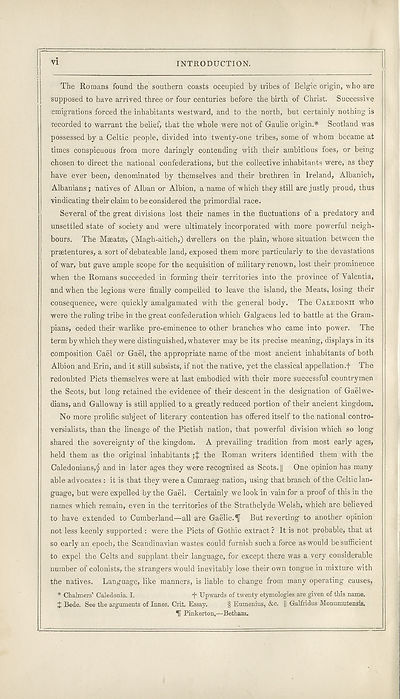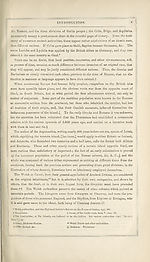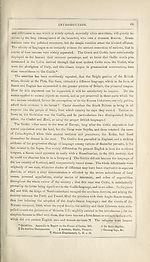Books and other items printed in Gaelic from 1871 to 1900 > Sar-obair nam bard Gaelach, or, The beauties of Gaelic poetry, and lives of the Highland bards
(18) Page vi
Download files
Complete book:
Individual page:
Thumbnail gallery: Grid view | List view

INTRODUCTION.
The Romans found the southern coasts occupied by tribes of Belgic origin, who are
supposed to have arrived three or four centuries before the birth of Christ. Successive
emigrations forced the inhabitants westward, and to the north, but certainly nothing is
recorded to warrant the belief, that the whole were not of Gaulic origin.* Scotland was
possessed by a Celtic people, divided into twenty-one tribes, some of whom became at
times conspicuous from more daringly contending with their ambitious foes, or being
chosen to direct the national confederations, but the collective inhabitants were, as they
have ever been, denominated by themselves and their brethren in Ireland, Albanich,
Albanians; natives of Alban or Albion, a name of which they still are justly proud, thus
vindicating their claim to be considered the primordial race.
Several of the great divisions lost their names in the fluctuations of a predatory and
unsettled state of society and were ultimately incorporated with more powerful neigh¬
bours. The Mmatae, (Magh-aitich,) dwellers on the plain, whose situation between the
prsetentures, a sort of debateable land, exposed them more particularly to the devastations
of war, but gave ample scope for the acquisition of military renown, lost their prominence
when the Romans succeeded in forming their territories into the province of Valentia,
and when the legions were finally compelled to leave the island, the Meats, losing their
consequence, were quickly amalgamated with the general body. The Caledonii who
were the ruling tribe in the great confederation which Galgacus led to battle at the Gram¬
pians, ceded their warlike pre-eminence to other branches who came into power. The
term by which they were distinguished, whatever may be its precise meaning, displays in its
composition Gael or Gael, the appropriate name of the most ancient inhabitants of both
Albion and Erin, and it still subsists, if not the native, yet the classical appellation.! The
redoubted Piets themselves were at last embodied with their more successful countrymen
the Scots, but long retained the evidence of their descent in the designation of Gaelwe-
dians, and Galloway is still applied to a greatly reduced portion of their ancient kingdom.
No more prolific subject of literary contention has offered itself to the national contro¬
versialists, than the lineage of the Pictish nation, that powerful division which so long
shared the sovereignty of the kingdom. A prevailing tradition from most early ages,
held them as the original inhabitants the Roman writers identified them with the
Caledonians,^ and in later ages they were recognised as Scots. || One opinion has many
able advocates : it is that they were a Cumraeg nation, using that branch of the Celtic lan¬
guage, but were expelled by the Gael. Certainly we look in vain for a proof of this in the
names which remain, even in the territories of the Strathclyde Welsh, which are believed
to have extended to Cumberland—all are Gaelic.^” But reverting to another opinion
not less keenly supported : were the Piets of Gothic extract ? It is not probable, that at
so early an epoch, the Scandinavian wastes could furnish such a force as would be sufficient
to expel the Celts and supplant their language, for except there was a very considerable
number of colonists, the strangers would inevitably lose their own tongue in mixture with
the natives. Language, like manners, is liable to change from many operating causes,
* Chalmers’ Caledonia. I. •(' Upwards of twenty etymologies are given of this name.
X Bede. See the arguments of Innes. Grit. Essay. § Eumenius, &c. || Gulfridus Monumutensis,
T[ Pinkerton,—Betham.
The Romans found the southern coasts occupied by tribes of Belgic origin, who are
supposed to have arrived three or four centuries before the birth of Christ. Successive
emigrations forced the inhabitants westward, and to the north, but certainly nothing is
recorded to warrant the belief, that the whole were not of Gaulic origin.* Scotland was
possessed by a Celtic people, divided into twenty-one tribes, some of whom became at
times conspicuous from more daringly contending with their ambitious foes, or being
chosen to direct the national confederations, but the collective inhabitants were, as they
have ever been, denominated by themselves and their brethren in Ireland, Albanich,
Albanians; natives of Alban or Albion, a name of which they still are justly proud, thus
vindicating their claim to be considered the primordial race.
Several of the great divisions lost their names in the fluctuations of a predatory and
unsettled state of society and were ultimately incorporated with more powerful neigh¬
bours. The Mmatae, (Magh-aitich,) dwellers on the plain, whose situation between the
prsetentures, a sort of debateable land, exposed them more particularly to the devastations
of war, but gave ample scope for the acquisition of military renown, lost their prominence
when the Romans succeeded in forming their territories into the province of Valentia,
and when the legions were finally compelled to leave the island, the Meats, losing their
consequence, were quickly amalgamated with the general body. The Caledonii who
were the ruling tribe in the great confederation which Galgacus led to battle at the Gram¬
pians, ceded their warlike pre-eminence to other branches who came into power. The
term by which they were distinguished, whatever may be its precise meaning, displays in its
composition Gael or Gael, the appropriate name of the most ancient inhabitants of both
Albion and Erin, and it still subsists, if not the native, yet the classical appellation.! The
redoubted Piets themselves were at last embodied with their more successful countrymen
the Scots, but long retained the evidence of their descent in the designation of Gaelwe-
dians, and Galloway is still applied to a greatly reduced portion of their ancient kingdom.
No more prolific subject of literary contention has offered itself to the national contro¬
versialists, than the lineage of the Pictish nation, that powerful division which so long
shared the sovereignty of the kingdom. A prevailing tradition from most early ages,
held them as the original inhabitants the Roman writers identified them with the
Caledonians,^ and in later ages they were recognised as Scots. || One opinion has many
able advocates : it is that they were a Cumraeg nation, using that branch of the Celtic lan¬
guage, but were expelled by the Gael. Certainly we look in vain for a proof of this in the
names which remain, even in the territories of the Strathclyde Welsh, which are believed
to have extended to Cumberland—all are Gaelic.^” But reverting to another opinion
not less keenly supported : were the Piets of Gothic extract ? It is not probable, that at
so early an epoch, the Scandinavian wastes could furnish such a force as would be sufficient
to expel the Celts and supplant their language, for except there was a very considerable
number of colonists, the strangers would inevitably lose their own tongue in mixture with
the natives. Language, like manners, is liable to change from many operating causes,
* Chalmers’ Caledonia. I. •(' Upwards of twenty etymologies are given of this name.
X Bede. See the arguments of Innes. Grit. Essay. § Eumenius, &c. || Gulfridus Monumutensis,
T[ Pinkerton,—Betham.
Set display mode to:
![]() Universal Viewer |
Universal Viewer | ![]() Mirador |
Large image | Transcription
Mirador |
Large image | Transcription
Images and transcriptions on this page, including medium image downloads, may be used under the Creative Commons Attribution 4.0 International Licence unless otherwise stated. ![]()
| Permanent URL | https://digital.nls.uk/109809289 |
|---|
| Description | Out-of-copyright books printed in Gaelic between 1631 and 1900. Also some pamphlets and chapbooks. Includes poetry and songs, religious books such as catechisms and hymns, and different editions of the Bible and the Psalms. Also includes the second book ever published in Gaelic in 1631. |
|---|

